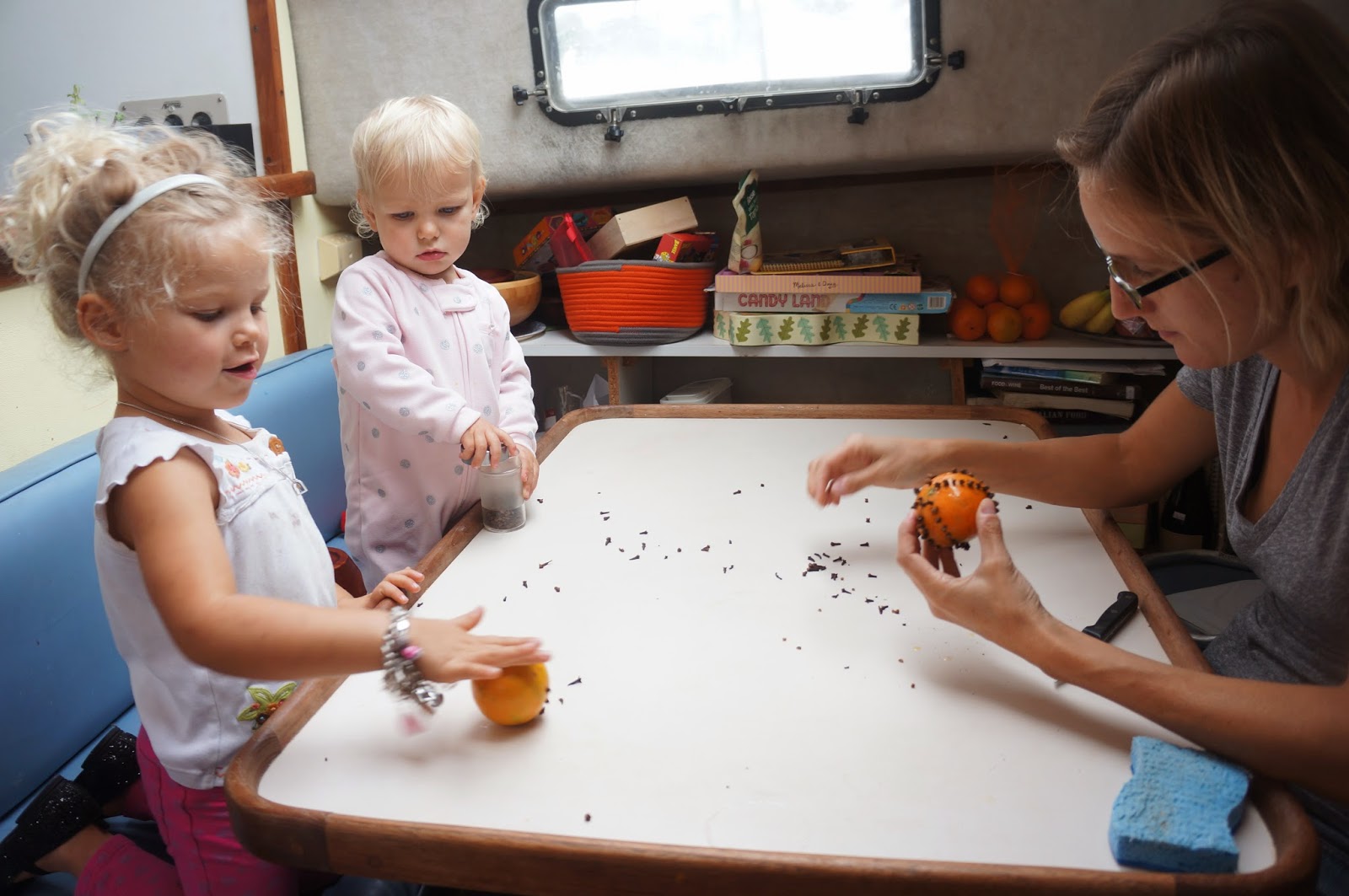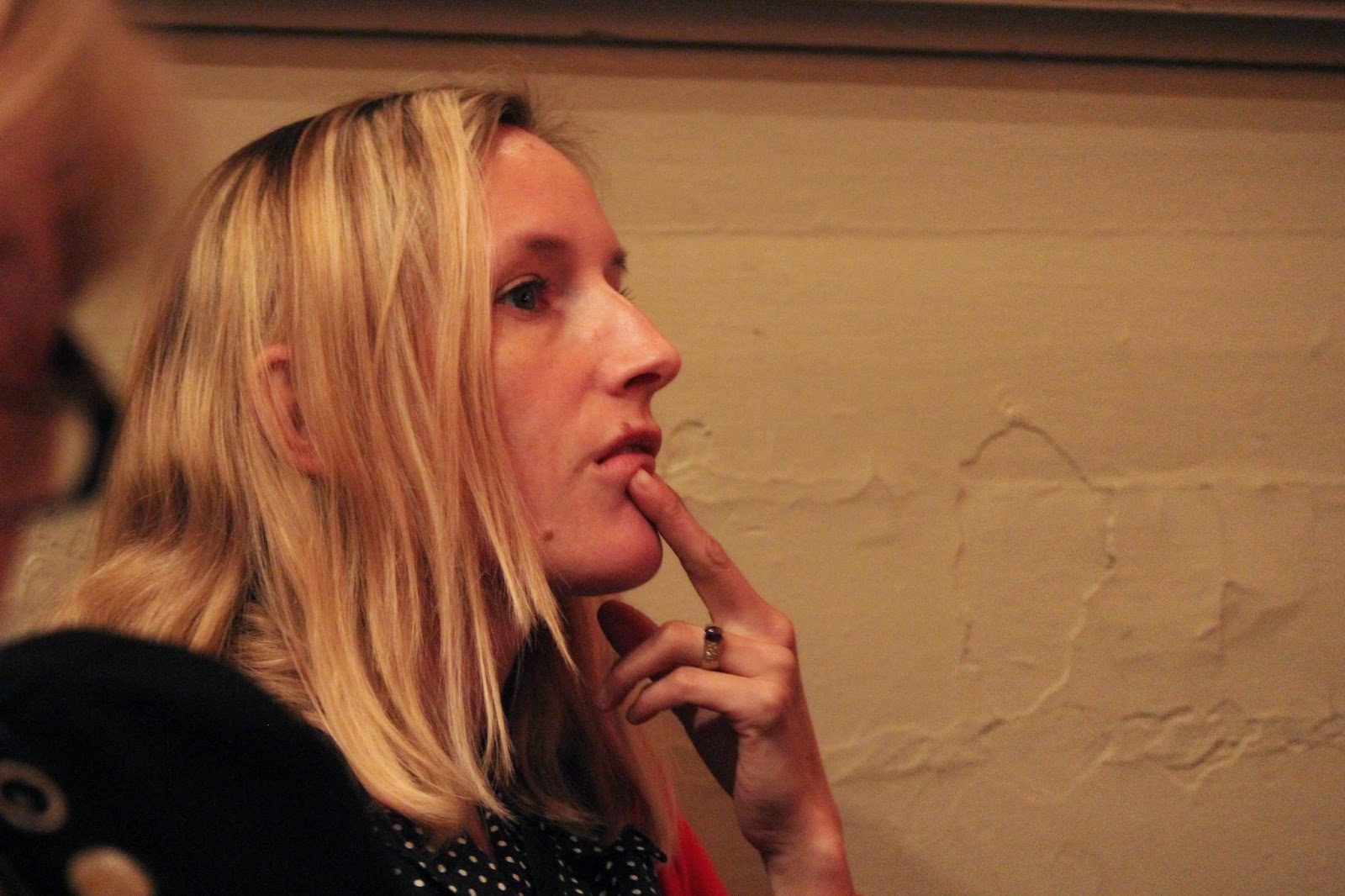Why do I liveaboard? Why do I choose to live on a boat that is 36’ long and 14’ wide with my husband and two small children?
I can easily tell you why someone wouldn’t want to choose this life. The lack of space, lack of privacy, lack of a yard or garden, lack of appliances, lack of lack of lack of.
 |
| It's pretty small. Main cabin (living room) looking forward. |
 |
| Galley. |
Yes, our floating home is lacking a lot of comforts and stuff that has become standard in the modern world. But we make up for it ten-fold with the things we have that we wouldn’t necessarily get if we lived on land.
Economies. Economy of scale and and fiscal economy.
Our space is small so we only have exactly what we need.
Shoes and clothes
I have a few pairs of shoes, each of which matches a number of different outfits and occasions. I wear my shoes until they wear out and then I carefully consider the replacement pair. The same goes for clothes. I rummage through the racks at thrift stores for higher quality brands in similar styles and complementary colors so I can mix and match.
The galley (kitchen)
We have four pots and pans: a 9” cast iron skillet with high sides, a 9” cast iron pancake pan (pankakor pan), a 3 quart stainless steel pot, and a very small 1 quart pot. Plus a tea kettle. We have one wooden spoon, one spatula, one whisk, one cutting board, etc. The exception: we have quite a number of knives on a wall-mounted magnetic rack, because you can’t cook without good knives.
 |
| And it is possible to make amazing birthday cakes, like Freja's pankakor torte for her 3rd birthday. |
Linens
We have one sheet set for the vee-berth bunks, one cotton and one flannel sheet set for our bed, one towel per person, a few hand towels, and many, many washcloths (to wipe little faces after meals).
I’ll stop inventorying our boat otherwise I’ll be tempted to stop writing and start filling some bags to bring to Goodwill. Of course I do have to mention the absolute lack of stuff needed to raise kids on board. And this can only be considered a good thing. No crib. No big high chair. No changing table/dresser combo. And the lack of toys. Oh joy, the lack of toys!
 |
| Freja finding a cozy spot next to her tiny kitchen we found in Sweden. |
 |
| And the kitchen strainer is always a fun toy. |
 |
| No big bathtub but two tubs that can be brought out to play in on the back deck. |
 |
Matilda, summer 2014.
Wearing the exact same clothes and hat Freja was wearing during summer 2012.
Reduce, reuse, recycle. |
My point is that we have exactly what we need and we aren’t trapped in the endless cycle of consumerism and waste. It is nice to buy shiny new things at the store, but, in the long run, shopping isn’t fulfilling and doesn’t make me happy in the same way as spending a day at the beach or eating a nice dinner does.
Economy of scale directly translates to fiscal economy. It’s cheap to live on a boat. Not only do we not spend money on stuff, marina fees are much much lower than rent and things like parking, internet, laundry, trash, water, and a community pool are included in our monthly slip fee. We’ll gradually pay off our student loans and gradually work our way back to the kind of economic freedom we enjoyed when we were cruising in the Caribbean.
In the meantime, a liveaboard life isn’t a static one. Even if we are living at the same marina for years, just by virtue of living on a floating home that has the ability to take us places (say from Philadelphia to Jacksonville!), we live with the possibility of the dream. Open horizons. Adventure. Sure, we’re not going anywhere anytime soon. We’re tied up with work and the care of two small children, but at least we can sit on our back deck with cold beers and dream about going somewhere, knowing that the dream can be a reality. We can chat with active cruisers and live vicariously through them. The proximity to the dream makes it seem more real.
 |
| dreaming of this ... |
 |
| and this ... |
 |
| and this. |
 |
| This... |
 |
| and this. |
A boater’s proximity to nature is another compelling reason that keeps me living aboard. I know when it’s raining, I know when the temperature changes a couple degrees, I know when the sun rises and sets. I’m conscious of how much plastic and packaging I bring aboard and how much trash I make, because I have to bring it all off again. We wear clothes multiple times before washing because we have to haul everything up to the marina laundry. Alternatively, I do tons of small loads in our mini onboard washing machine. So the choice is daily laundry or hauling heavy bags to and fro. It’s easy to wear clothes 2, 3, or 4 times before washing. I use eco-friendly cleaners like vinegar because all of our gray water goes overboard. One-ply toilet paper because our septic system is sensitive. What am I lacking? Compost. Oh don’t get me wrong, I make a lot of compost, but sadly it all goes in the trash because I don’t have the space nor need for a compost bin.*
 |
| Hello beautiful sunset, Philadelphia, summer 2013. |
 |
| And hello intense storm, near Savannah Georgia, summer 2014. |
Of course, the main reason that I liveaboard is happenstance. We first moved aboard with the goal of cruising the Caribbean. We did that and when we moved back to the States we just never moved back onto land. This boat is my home. Why go anywhere else? I can wax poetic about the sunrises and the wildlife and the simple life, all of which make living aboard pleasant, but, the bottom line, when I’m on my boat, I’m home. I’m comfortable, I’m happy, I’m safe. I have what I need and what I want. (Again, see*.) Why live anywhere else?
Yet, yet … the majority of the world lives on land, so what kind of person has chosen this floating life? If you want to meet an oddball or two take a walk down the nearest dock. Liveaboards tend to be an eccentric breed. Liveaboards fit in all different boxes: young people, hippies, retirees, early retirees, families, religious missionaries, tax evaders, bachelors, part-time cruisers. You name it and you’ll probably find it.
I think I’m a pretty run-of-the-mill, upper-middle class white American. What is it about my personality that makes me a successful liveaboard? I’m pretty low maintenance. Makeup? Eh. Clothes? Eh. Shoes? Eh. Fancy electronics? Eh. I love the internet but I see the value in unplugging. I’m a bit of a DIY-er, though I hate to do blue jobs. I get tremendous satisfaction from the self-sufficiency that living aboard demands. I like the simple life, but I also like to eat out. I like being on my own floating island, but I also need a large circle of friends and daily social interaction.
There is no specific personality that guarantees a successful liveboard, just a willingness to be different, learn, live with less, live simply, be open, and, perhaps most importantly, not be prone to seasickness.
*I wish I had the need for a compost bin. I love so many things about my life aboard; I’ve learned to live with so many idiosyncrasies about life aboard; I don’t sit around pining for such-and-such landlubbing amenity. Except a garden. I would LOVE to have a yard and a garden. Yes, I have seriously considered finding some undeveloped waterfront land where we can park the boat and grow veggies.


























































